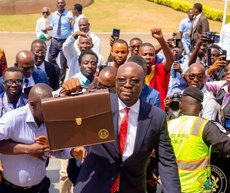Business News of Wednesday, 2 April 2025
Source: www.ghanawebbers.com
2025 Budget: A missed opportunity to drive industrial growth and global competitiveness?

Industry experts are concerned about the lack of a clear path for industrialization in Ghana's GH¢226 billion budget. The budget allocates only GH¢1.5 billion to the Agriculture for Economic Transformation Agenda (AETA). However, it lacks details on how this will create industrial value. There is no substantial plan to boost Ghana’s industrial and manufacturing sectors.
Harmony Attise, Founder of Ambidexterity for Africa (A4A), emphasizes that industrialization drives sustainable development and job creation. She questions the absence of policies and investments aimed at building Ghana's industrial base. Without a strategy, Ghana risks remaining dependent on raw materials instead of creating real value.
The budget does not address key questions about industrial growth. A4A highlights several critical issues that remain unanswered:
1. What strategies exist to add value to Ghana's natural resources?
2. How will businesses adopt advanced technologies to compete globally?
3. What plans are there to tackle structural barriers limiting competitiveness?
4. If Ghana wants to benefit from AfCFTA, what is the roadmap for strengthening industry?
There is also concern about growth without clarity on its nature. While social programs are important, investment in industry is crucial for sustainability. Harmony warns against dependency on aid if industries aren't strong enough.
The budget proposes increasing the Growth and Sustainability Levy on mining companies from 1% to 3%. This move aims to boost government revenue but lacks a policy on using this revenue for industrial development or innovation.
A4A believes this budget was an opportunity to launch a National Industrial Competitiveness Framework, which could include:
- Sector-specific policies for value addition.
- Incentives for adopting modern technologies.
- Support for industrial clusters.
- Capacity-building programs for firms.
While government leadership is vital, A4A works to support businesses in building innovation capacities. They have developed tools to assess companies' readiness for growth and competitiveness.
For success at scale, government partnership is essential. A4A calls for urgent steps:
1. Develop a National Industrial Competitiveness Strategy with concrete targets.
2. Establish an Industrial Competitiveness Fund using increased mining revenues.
3. Adopt tools that help firms improve global competitiveness.
4. Foster partnerships between government, industry, and academia.
Ghana stands at a pivotal moment with AfCFTA and shifts in global supply chains. Its future as an industrial player depends on today's decisions.
Harmony Attise states that without investment in capacity and innovation, Ghana's potential will remain unrealized. The time to act is now if Ghana wants to compete effectively in the global economy.










